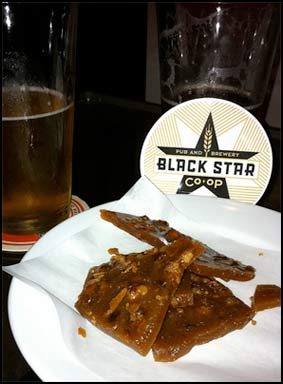
The excellence of Austin has been remarked upon, again and again, by House the Homeless, and here is another example of why. Not long ago, a writer named Nona Willis Aronowitz enjoyed a meal at the Black Star Co-op, noticed the lack of a tip jar at the bar, and chased down the story behind its absence. It seems this place doesn’t believe in tips, as Aronowitz learned from interviewing co-founder Jeff Young, who is also the establishment’s brewer.
The reporter summed up:
Black Star Co-op, the first cooperatively owned microbrewery-restaurant in the country, offers their ‘worker’s assembly’ a wage of at least $16 a hour. The co-op provides health insurance and bonuses, too. After a yearlong apprenticeship, every worker also has the duties of a manager — they can hire and fire, get access to the books, and make financial decisions.
An employee with bills to pay should not be at the mercy of customers’ whims, with an uncertain, fluctuating income. That’s why the servers here just say no to tips. There isn’t a lavish amount to go around, and nobody’s getting rich. On the other hand, everybody makes a decent amount, as they should, because everyone who works here is responsible for a certain amount of managerial duties. That’s why they call it a co-op.
In Richard R. Troxell’s book Looking Up at the Bottom Line, there is a chapter on the history and the pros and cons of tipping. Sometimes it is very useful to examine customs and traditions that are part of the everyday landscape, and to dissect what they really mean. Richard sums up the perspective of the folks at the Universal Living Wage with these thoughts:
While tipping today is generally intended to show gratitude, some of us believe that tipping should be done away with as it leads to unpredictable budgeting practices which destabilizes our most vulnerable workers and shifts financial responsibility from the employers who benefit from the work, to the restaurant patron.
The Black Star’s own website offers plenty more information about their innovative methods, like the fact that anybody can join, not just the people who work there. “By becoming a member-owner of Black Star Co-op, you’ll have a vote in co-op affairs and you’ll have benefits at the brewpub,” the page says. By doing just that simple thing, a person can support local farms and producers, a democratic workplace, great quality and service, worker self-management, community action, and a wage that workers can actually live on. What’s not to like?
Education is an important item on Black Star’s agenda, and the International Co-operative Alliance is a big influence, with its set of beautiful, yet achievable ideals:
A co-operative is an autonomous association of persons united voluntarily to meet their common economic, social, and cultural needs and aspirations through a jointly-owned and democratically-controlled enterprise. Co-operatives are based on the values of self-help, self-responsibility, democracy, equality, equity and solidarity. In the tradition of their founders, co-operative members believe in the ethical values of honesty, openness, social responsibility and caring for others.
The momentum began in 2006 when several people gathered to explore the possibilities of Steven Yarak’s vision, which in turn had been inspired by neighborhood pubs in Belgium. Young was there right from the start. In fact, through one of those strange coincidences in which the universe abounds, he had arrived in Austin only a few days earlier, and the gleam in his eye was the notion of starting a microbrewery. The group made plans, organized a fundraiser, bought equipment — and a marvelous idea became reality.
Here is a list of the co-op’s principles, explained in more detail on its site, which is as worthy of a visit as the establishment itself:
Voluntary and Open Membership
Democratic Member Control
Member Economic Participation
Autonomy and Independence
Education, Training and Information
Co-operation among Co-operatives
Concern for Community
Admittedly, the microbrewery subsidizes the restaurant and makes its unique operational method possible. All this shows is, where there’s a will, there’s a way. If people want to create an alternative business model, it’s doable.
The Black Star Co-op hopes to be a role model for other businesses not only in Austin but across the country. Just like the Universal Living Wage, another Austin-born idea that could change the American economic landscape. Everything about the ULW is laid out in great detail via its own website, which connects the dots between widespread homelessness and the inadequacy of the federal minimum wage. Here’s a brief excerpt:
The proposal, through a ten year plan, is to fix the Federal Minimum Wage by indexing it to the local cost of housing throughout the United States. The ULW would end homelessness for over 1,000,000 minimum wage workers and prevent economic homelessness for all 10.1 million minimum wage workers. By using existing government guidelines: 1) work 40 hours in a week, 2) spend no more than 30% of one’s income on housing, and 3) using the HUD section 8 rental calculations, we ensure that anyone working 40 hours in a week will be able to afford basic rental housing, food, clothing, utilities, and access to health care.
Reactions?
Source: “At One Austin Restaurant, a Living Wage Doesn’t Depend on Tips,” Good, 04/24/12
Source: “Black Star Co-op,” BlackStar
Source: “Co-operate,” BlackStar
Image by Mike Miley (H. Michael Miley), used under its Creative Commons license.


